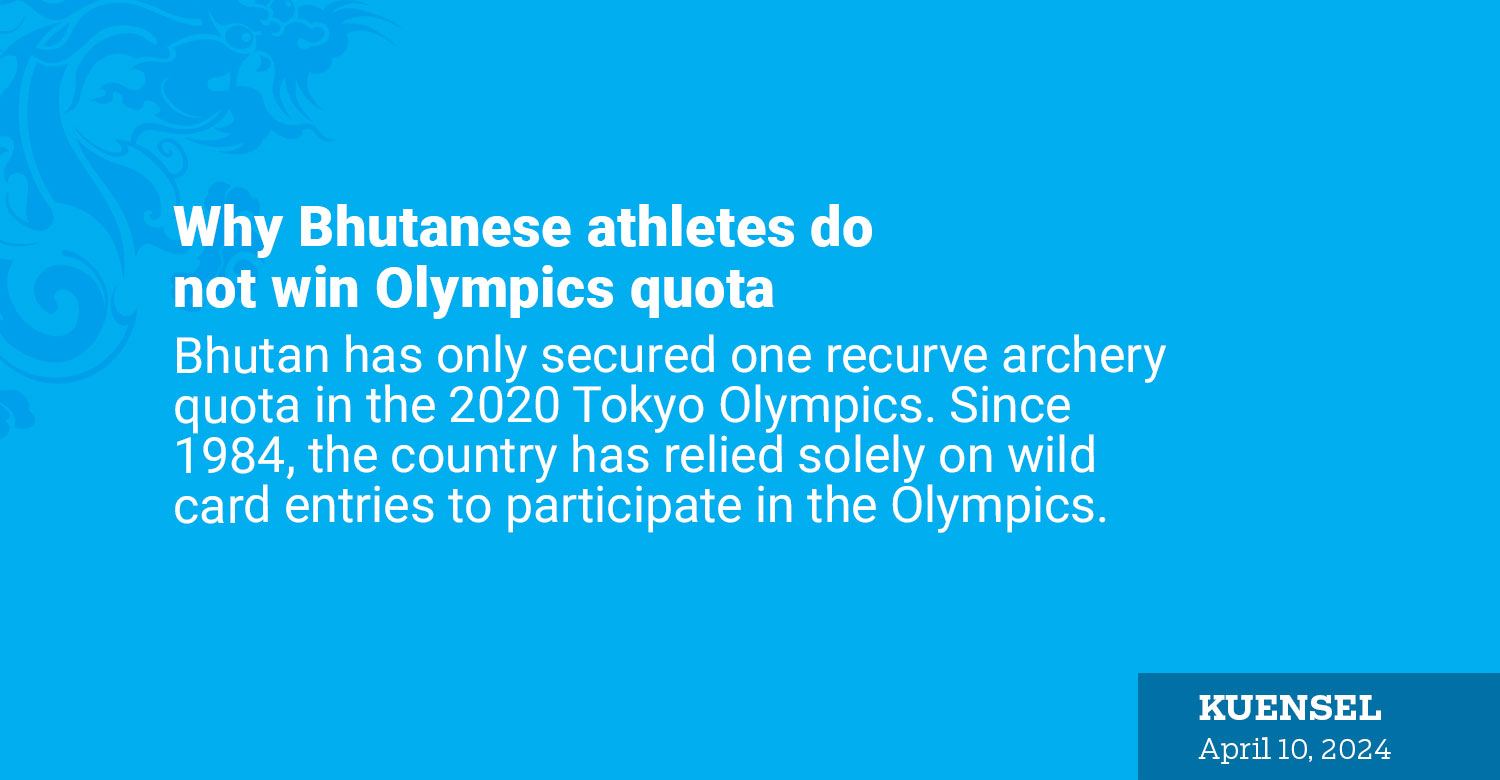Thinley Namgay
Bhutan has only secured one recurve archery quota in the 2020 Tokyo Olympics. Since 1984, the country has relied solely on wild card entries to participate in the Olympics.
Sports officials say insufficient international game exposure is a major obstacle preventing athletes from achieving their Olympic quota dreams.
In contrast to other countries where sports federations send athletes to at least 10 international tournaments annually, Bhutanese athletes can only participate in two or three such events. This limited exposure to international competitions hampers their training and development.
Bhutan’s sports federations and associations face budget constraints limiting their ability to afford more international tournaments. Additionally, joint training opportunities in other countries are scarce.
The current government funding falls short of meeting the needs of sports federations and associations for sports development.
Inadequate training is another significant factor. Securing an Olympic quota requires years of rigorous training and unwavering dedication, a path pursued by athletes from other countries.
In Bhutan, most sports federations and associations provide only a few months of training to their athletes before making them compete at Olympic qualification matches. This approach has resulted in underperformance by Bhutanese athletes thus far.
Some national athletes are students who must balance their focus between studies and training.
Officials blame this on low motivation among national athletes.
Besides footballers, salaries or stipends for other national players are minimal, and concerns about future job opportunities after retirement linger.
Many parents still prioritise studies over sports for their children.
Currently, football stands out as the primary sport in Bhutan with the potential to generate employment opportunities for players, coaches, and support staff.
Major Bhutan Premier League clubs offer competitive salaries for coaches and players, serving as a source of inspiration for aspiring athletes.
However, the absence of international standard training facilities and qualified coaches remains a significant issue.
Budget constraints prevent sports federations and associations from hiring international coaches, hindering the development of potential athletes.
Lapses in the education system
Promoting a culture of sports participation and excellence from grassroots levels is widely viewed as a crucial strategy for nurturing talented athletes.
However, the country’s education system lacks inclusivity, as sports are often regarded merely as leisure activities rather than opportunities to instil essential sporting values and skills in children from an early age, preparing them for future professional careers in sports.
Sports education in other countries begins at the pre-primary level, but many primary schools in the country lack adequate sports facilities and instructors.
Many Bhutanese athletes have not received proper sports education.
What needs to be done?
A senior coach emphasised the necessity of sending our players for joint training camps with other countries and having them participate in numerous international tournaments before the Olympic Games to enhance their chances of qualifying.
He said that preparation should start promptly after the conclusion of the Olympic Games for the next edition.
“We require comprehensive sports research and development studies and the establishment of high-performance sports centres where our elite athletes can train and prepare effectively. It’s imperative to have proper sports facilities in all regions and establish regional sports development centres,” a coach said.
Athletes and officials stress the importance of fostering a vibrant culture of dzongkhag, regional games, and national-level competitions among schools.
Coaches say that there is a need for sports federations and associations to organise selection camps to identify talented players and to provide ongoing education and training for coaches.
Way forward
In the 13th Five-Year Plan, the government has promised to invest more in sports, particularly in infrastructure development.
Recently, a Memorandum of Understanding (MoU) was signed between Bhutan and India for youth and sports development which aims to provide Bhutanese athletes with access to top-notch facilities, coaches, and training opportunities in India.


